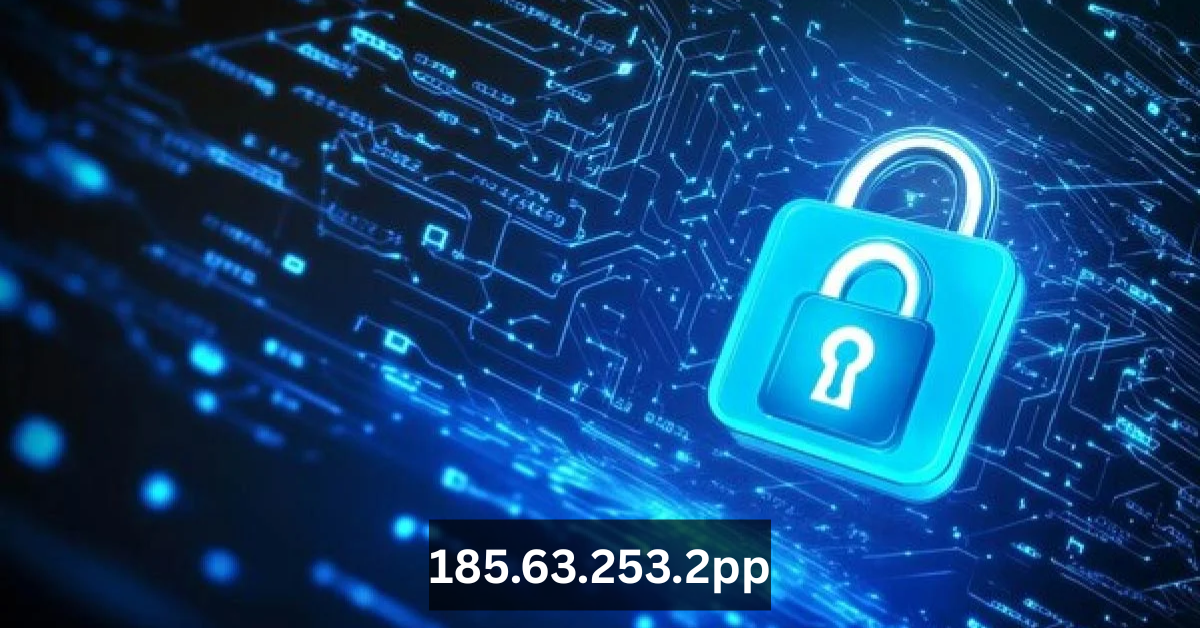In recent years, the strange-looking term 185.63.253.2pp has surfaced across online searches, technical forums, and even cybersecurity discussions. Unlike a typical IP address, which follows the familiar IPv4 format of four numeric octets separated by dots, this version carries an unusual “pp” suffix at the end. The uniqueness of this string makes it a hot topic for those working in networking, IT security, and even SEO. People are curious because they encounter 185.63.253.2pp in logs, articles, or suspicious website activities, and they want to know if it is valid, what it means, and whether it poses risks. This curiosity has led to a surge in searches for 185.63.253.2pp meaning and 185.63.253.2pp explained.
To make things clear, 185.63.253.2pp is not a valid IP address. The “pp” suffix makes it malformed because IP addresses must only contain numbers in four octets ranging between 0 and 255. However, behind this malformed form lies the real IP address 185.63.253.2, which is a genuine IPv4 address registered to HostPalace Datacenters Ltd., an organization operating from the Netherlands. By appending “pp” to it, some logs, scripts, or even automated bots may be generating a tag that leads to confusion. This is why understanding 185.63.253.2pp security and its implications is important for both technical experts and everyday users.
Understanding the Basics of IP Addresses
What is an IP address and how it works
An IP address, or Internet Protocol address, is the digital identifier assigned to every device connected to the internet. It functions much like a postal address, ensuring data packets travel across the web and reach the right destination. In IPv4 format, addresses consist of four numbers separated by dots. For example, 185.63.253.2 is a proper IPv4 address. However, when altered or incorrectly formatted, it can lead to confusion, as seen with 185.63.253.2pp.
Difference between valid and invalid IP formats
Valid IP addresses follow strict rules. They must contain only numeric octets between 0 and 255. Anything outside this range or containing additional characters becomes an invalid IP address. 185.63.253.2pp falls into the invalid category due to the “pp” suffix, which violates IP formatting standards. This is why many users searching for what is 185.63.253.2pp are told it is malformed or invalid. Invalid IPs cannot be routed across the internet, but they can appear in logs due to typos, bot activity, or automated annotations.
Why “185.63.253.2pp” is not a standard IP address
The strict structure of IPv4 does not allow letters in an address. Therefore, 185.63.253.2pp cannot be recognized by browsers, routers, or DNS resolvers. However, the base address 185.63.253.2 is genuine and belongs to ASN AS60064, managed by HostPalace. This explains why people investigating the term often land on IP lookup services such as IPinfo, RIPE, or reputation checkers like AbuseIPDB.
Decoding 185.63.253.2pp
The role of the “pp” suffix
The most confusing part of 185.63.253.2pp is its “pp” suffix. In many cases, the suffix may result from system logging anomalies, proxy tagging, or even bot-generated obfuscation. Some analysts suggest that “pp” could stand for “post-process” or “proxy path,” though there is no universal agreement. What matters is that it turns a valid IP into a malformed IP.
Technical reasons why it’s malformed
In networking standards, non-numeric values in an IP address string make it invalid. This means 185.63.253.2pp cannot function in routing tables or DNS queries. Instead, it appears as noise in logs or attempts to evade security filters that only block valid IP patterns. For cybersecurity professionals, such malformed IPs often serve as red flags for potential malicious behavior.
Real IP behind the string: 185.63.253.2
When the “pp” is removed, the underlying IP 185.63.253.2 emerges as a legitimate address. A WHOIS lookup confirms that this IP belongs to Hostpalace Datacenters Ltd., part of the HOSTPALACE CLOUD infrastructure in Amsterdam. The IP range 185.63.253.0/24 is linked to ASN AS60064, which connects through major European exchanges such as AMS-IX. This shows that while 185.63.253.2pp is invalid, the IP it references is part of a real and active hosting network.
Ownership and Hosting Information of 185.63.253.2
WHOIS lookup and HostPalace Datacenters Ltd.
A WHOIS lookup through the RIPE database identifies 185.63.253.2 as registered to HostPalace Datacenters Ltd., a known hosting company. Organizations like IPinfo provide additional insights, confirming the IP’s geolocation in the Netherlands. This transparency helps users and businesses understand the origin of the IP traffic associated with 185.63.253.2pp.
ASN AS60064 and network background
The IP is part of ASN AS60064, an autonomous system number assigned to HostPalace. ASNs define groups of IP addresses controlled by a single operator. This means traffic from 185.63.253.2 or malformed entries like 185.63.253.2pp likely originates from servers in HostPalace’s infrastructure. Because hosting providers often rent out servers to third parties, IPs in this range can sometimes appear in abuse reports.
Why hosting provider IPs matter in cybersecurity
Hosting provider IPs such as 185.63.253.2 play a central role in cybersecurity analysis. They are often used by businesses, websites, and occasionally by malicious actors deploying proxies, bots, or VPNs. Therefore, security teams treat unusual variations like 185.63.253.2pp with caution, as malformed entries can mask suspicious behaviors.
Security Concerns Related to 185.63.253.2pp
Potential misuse in hacking or bot activity
While 185.63.253.2pp is not a real IP, its existence in logs can indicate automated bot traffic or an attempt at obfuscation. Cyber attackers may append random letters to IPs to evade filters or mislead security teams. Monitoring such malformed IPs is essential to reduce cybersecurity risks.
Risks for websites and servers
If traffic linked to 185.63.253.2pp shows up in your logs, it could signal bots probing your server, malformed packets, or attempts to bypass filters. These scenarios raise the possibility of brute-force attacks, scanning, or spam campaigns. For this reason, 185.63.253.2pp security has become a concern for both small website owners and large enterprises.
How malformed IPs appear in SIEM and firewall logs
Security tools like SIEM (Security Information and Event Management) systems often catch malformed IPs such as 185.63.253.2pp. They may appear due to parsing errors, proxy annotations, or deliberate obfuscation. Properly analyzing these logs helps security teams separate harmless noise from genuine threats.
How to Investigate 185.63.253.2pp
Checking reputation and abuse reports
One effective way to investigate 185.63.253.2pp is by looking at the base IP 185.63.253.2 in reputation databases such as AbuseIPDB. If the IP has a history of malicious activity, it is flagged by community reports. This allows administrators to make informed decisions about blocking or monitoring the IP.
Tools for IP analysis (WHOIS, AbuseIPDB, IPinfo)
Several reliable tools can provide detailed information. WHOIS lookup services, the RIPE database, IPinfo APIs, and AbuseIPDB are all valuable. These tools confirm the IP’s owner, its ASN, geolocation in Amsterdam, and any associated threat intelligence. Using them ensures accurate analysis of 185.63.253.2pp entries.
How to strip suffixes and analyze the base IP
To investigate 185.63.253.2pp, the first step is removing the “pp” suffix to isolate the valid IP. Once reduced to 185.63.253.2, it can be cross-checked through WHOIS, geolocation services, and reputation databases. This process provides clarity and ensures administrators are dealing with verified data.
Common Use Cases and Misinterpretations
Typos and transcription errors in logs
Many instances of 185.63.253.2pp are likely caused by typos or faulty logging scripts. A simple clerical error during recording can transform a valid IP into a malformed string.
Obfuscation by bots or scripts
Bots often use obfuscation to slip past filters. Adding characters like “pp” to an IP string is one method to confuse detection tools. This makes it harder for automated systems to block malicious traffic.
When “pp” could mean annotation or tagging
In some cases, “pp” might simply be a tag added by a proxy server or monitoring tool. For instance, “pp” could represent an internal label such as “proxy path” or “post-processing.” While speculative, this explains how 185.63.253.2pp may appear in certain technical systems.
How to Protect Your Systems from Malformed IPs
Firewall rules and blocking suspicious IPs
Administrators can configure firewalls to block suspicious requests involving malformed IPs like 185.63.253.2pp. Additionally, creating blocklists based on check abuse reports 185.63.253.2 ensures only safe traffic is allowed.
Log hygiene and data parsing practices
Regular log hygiene prevents misinterpretations. Parsing scripts should clean entries like 185.63.253.2pp by stripping invalid characters before analysis. This ensures security teams work with reliable data.
Monitoring traffic from hosting providers
Since hosting providers often generate mixed traffic, constant monitoring of IPs like 185.63.253.2 is necessary. Tools like SIEM and BGP Tools can help track patterns and detect anomalies.
Practical Guide for SEO & Tech Writers Using 185.63.253.2pp
How to use the keyword naturally in articles
Writers covering 185.63.253.2pp should weave it naturally into explanations about malformed IPs, cybersecurity, and hosting. Overuse can feel unnatural, so placement in headings, FAQs, and introductions is ideal.
LSI keywords and semantic optimization
By including related terms such as “invalid IP address,” “malformed IP,” “WHOIS lookup,” and “IP reputation,” content becomes semantically richer and more search-friendly.
Suggested FAQs for better ranking
Adding an FAQ section targeting search queries like “is 185.63.253.2pp a real IP address” or “what does pp mean after an IP address” captures long-tail traffic and builds trust.
Conclusion
185.63.253.2pp is not a valid IP, but the base IP 185.63.253.2 is real and registered to HostPalace. The malformed suffix creates confusion but also signals potential risks.
In a digital age filled with both opportunity and risk, strange entries like 185.63.253.2pp remind us of the importance of vigilance. By investigating IPs, maintaining strong log hygiene, and leveraging trusted tools like WHOIS, IPinfo, RIPE, and AbuseIPDB, businesses and individuals alike can stay safe, informed, and prepared.
Frequently Asked Questions
Is 185.63.253.2pp a real IP address?
No. It is malformed. The real IP behind it is 185.63.253.2.
What does the “pp” suffix mean?
It could be an error, bot obfuscation, or annotation added by systems.
Who owns 185.63.253.2?
The IP is owned by HostPalace Datacenters Ltd., ASN AS60064, in Amsterdam.
Is traffic from 185.63.253.2pp dangerous?
Malformed IPs may indicate bot activity or misconfigurations. They should be investigated carefully.
How to block or report 185.63.253.2?
Use firewall rules and report suspicious activity to AbuseIPDB or similar databases.
Stay in touch to get more updates & alerts on Picnob! Thank you



